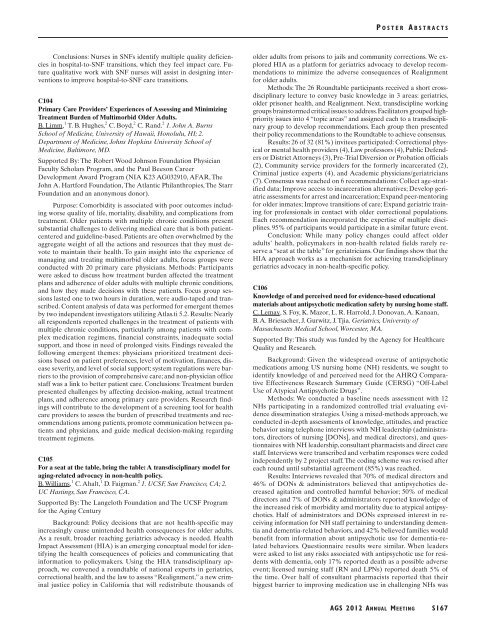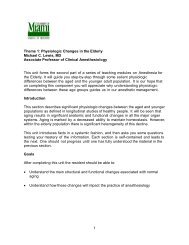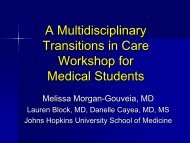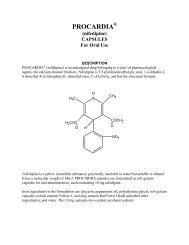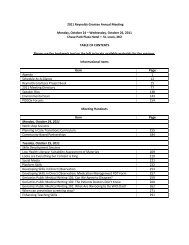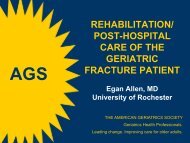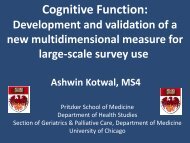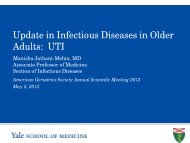Here - American Geriatrics Society
Here - American Geriatrics Society
Here - American Geriatrics Society
Create successful ePaper yourself
Turn your PDF publications into a flip-book with our unique Google optimized e-Paper software.
P OSTER<br />
A BSTRACTS<br />
Conclusions: Nurses in SNFs identify multiple quality deficiencies<br />
in hospital-to-SNF transitions, which they feel impact care. Future<br />
qualitative work with SNF nurses will assist in designing interventions<br />
to improve hospital-to-SNF care transitions.<br />
C104<br />
Primary Care Providers’ Experiences of Assessing and Minimizing<br />
Treatment Burden of Multimorbid Older Adults.<br />
B. Limm, 1 T. B. Hughes, 2 C. Boyd, 2 C. Rand. 2 1. John A. Burns<br />
School of Medicine, University of Hawaii, Honolulu, HI; 2.<br />
Department of Medicine, Johns Hopkins University School of<br />
Medicine, Baltimore, MD.<br />
Supported By: The Robert Wood Johnson Foundation Physician<br />
Faculty Scholars Program, and the Paul Beeson Career<br />
Development Award Program (NIA K23 AG032910, AFAR, The<br />
John A. Hartford Foundation, The Atlantic Philanthropies, The Starr<br />
Foundation and an anonymous donor).<br />
Purpose: Comorbidity is associated with poor outcomes including<br />
worse quality of life, mortality, disability, and complications from<br />
treatment. Older patients with multiple chronic conditions present<br />
substantial challenges to delivering medical care that is both patientcentered<br />
and guideline-based. Patients are often overwhelmed by the<br />
aggregate weight of all the actions and resources that they must devote<br />
to maintain their health. To gain insight into the experience of<br />
managing and treating multimorbid older adults, focus groups were<br />
conducted with 20 primary care physicians. Methods: Participants<br />
were asked to discuss how treatment burden affected the treatment<br />
plans and adherence of older adults with multiple chronic conditions,<br />
and how they made decisions with these patients. Focus group sessions<br />
lasted one to two hours in duration, were audio-taped and transcribed.<br />
Content analysis of data was performed for emergent themes<br />
by two independent investigators utilizing Atlas.ti 5.2. Results: Nearly<br />
all respondents reported challenges in the treatment of patients with<br />
multiple chronic conditions, particularly among patients with complex<br />
medication regimens, financial constraints, inadequate social<br />
support, and those in need of prolonged visits. Findings revealed the<br />
following emergent themes: physicians prioritized treatment decisions<br />
based on patient preferences, level of motivation, finances, disease<br />
severity, and level of social support; system regulations were barriers<br />
to the provision of comprehensive care; and non-physician office<br />
staff was a link to better patient care. Conclusions: Treatment burden<br />
presented challenges by affecting decision-making, actual treatment<br />
plans, and adherence among primary care providers. Research findings<br />
will contribute to the development of a screening tool for health<br />
care providers to assess the burden of prescribed treatments and recommendations<br />
among patients, promote communication between patients<br />
and physicians, and guide medical decision-making regarding<br />
treatment regimens.<br />
C105<br />
For a seat at the table, bring the table: A transdisciplinary model for<br />
aging-related advocacy in non-health policy.<br />
B. Williams, 1 C. Ahalt, 1 D. Faigman. 2 1. UCSF, San Francisco, CA; 2.<br />
UC Hastings, San Francisco, CA.<br />
Supported By: The Langeloth Foundation and The UCSF Program<br />
for the Aging Century<br />
Background: Policy decisions that are not health-specific may<br />
increasingly cause unintended health consequences for older adults.<br />
As a result, broader reaching geriatrics advocacy is needed. Health<br />
Impact Assessment (HIA) is an emerging conceptual model for identifying<br />
the health consequences of policies and communicating that<br />
information to policymakers. Using the HIA transdisciplinary approach,<br />
we convened a roundtable of national experts in geriatrics,<br />
correctional health, and the law to assess “Realignment,” a new criminal<br />
justice policy in California that will redistribute thousands of<br />
older adults from prisons to jails and community corrections. We explored<br />
HIA as a platform for geriatrics advocacy to develop recommendations<br />
to minimize the adverse consequences of Realignment<br />
for older adults.<br />
Methods: The 26 Roundtable participants received a short crossdisciplinary<br />
lecture to convey basic knowledge in 3 areas: geriatrics,<br />
older prisoner health, and Realignment. Next, transdiscipline working<br />
groups brainstormed critical issues to address.Facilitators grouped highpriority<br />
issues into 4 “topic areas” and assigned each to a transdisciplinary<br />
group to develop recommendations. Each group then presented<br />
their policy recommendations to the Roundtable to achieve consensus.<br />
Results: 26 of 32 (81%) invitees participated: Correctional physical<br />
or mental health providers (4), Law professors (4), Public Defenders<br />
or District Attorneys (3), Pre-Trial Diversion or Probation officials<br />
(2), Community service providers for the formerly incarcerated (2),<br />
Criminal justice experts (4), and Academic physicians/geriatricians<br />
(7). Consensus was reached on 6 recommendations: Collect age-stratified<br />
data; Improve access to incarceration alternatives; Develop geriatric<br />
assessments for arrest and incarceration; Expand peer-mentoring<br />
for older inmates; Improve transitions of care; Expand geriatric training<br />
for professionals in contact with older correctional populations.<br />
Each recommendation incorporated the expertise of multiple disciplines.<br />
95% of participants would participate in a similar future event.<br />
Conclusion: While many policy changes could affect older<br />
adults’ health, policymakers in non-health related fields rarely reserve<br />
a “seat at the table” for geriatricians. Our findings show that the<br />
HIA approach works as a mechanism for achieving transdiciplinary<br />
geriatrics advocacy in non-health-specific policy.<br />
C106<br />
Knowledge of and perceived need for evidence-based educational<br />
materials about antipsychotic medication safety by nursing home staff.<br />
C. Lemay, S. Foy, K. Mazor, L. R. Harrold, J. Donovan, A. Kanaan,<br />
B. A. Briesacher, J. Gurwitz, J. Tjia. <strong>Geriatrics</strong>, University of<br />
Massachusetts Medical School, Worcester, MA.<br />
Supported By: This study was funded by the Agency for Healthcare<br />
Quality and Research.<br />
Background: Given the widespread overuse of antipsychotic<br />
medications among US nursing home (NH) residents, we sought to<br />
identify knowledge of and perceived need for the AHRQ Comparative<br />
Effectiveness Research Summary Guide (CERSG) “Off-Label<br />
Use of Atypical Antipsychotic Drugs”.<br />
Methods: We conducted a baseline needs assessment with 12<br />
NHs participating in a randomized controlled trial evaluating evidence<br />
dissemination strategies. Using a mixed-methods approach, we<br />
conducted in-depth assessments of knowledge, attitudes, and practice<br />
behavior using telephone interviews with NH leadership (administrators,<br />
directors of nursing [DONs], and medical directors), and questionnaires<br />
with NH leadership, consultant pharmacists and direct care<br />
staff. Interviews were transcribed and verbatim responses were coded<br />
independently by 2 project staff. The coding scheme was revised after<br />
each round until substantial agreement (85%) was reached.<br />
Results: Interviews revealed that 70% of medical directors and<br />
46% of DONs & administrators believed that antipsychotics decreased<br />
agitation and controlled harmful behavior; 50% of medical<br />
directors and 7% of DONs & administrators reported knowledge of<br />
the increased risk of morbidity amd mortality due to atypical antipsychotics.<br />
Half of administrators and DONs expressed interest in receiving<br />
information for NH staff pertaining to understanding dementia<br />
and dementia-related behaviors, and 42% believed families would<br />
benefit from information about antipsychotic use for dementia-related<br />
behaviors. Questionnaire results were similar. When leaders<br />
were asked to list any risks associated with antipsychotic use for residents<br />
with dementia, only 17% reported death as a possible adverse<br />
event; licensed nursing staff (RN and LPNs) reported death 5% of<br />
the time. Over half of consultant pharmacists reported that their<br />
biggest barrier to improving medication use in challenging NHs was<br />
AGS 2012 ANNUAL MEETING<br />
S167


